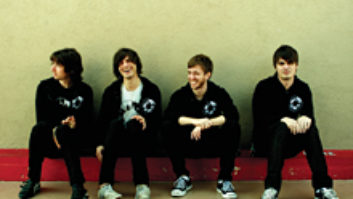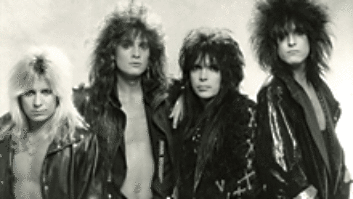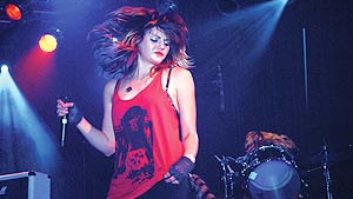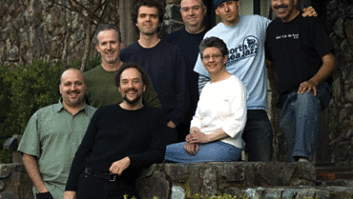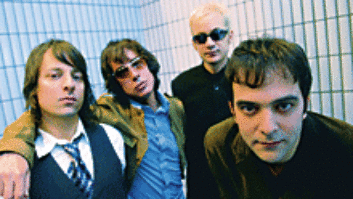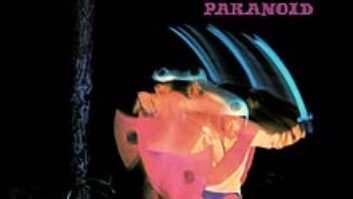Like a lot of people, I first heard the L.A. band Phantom Planet when their irresistible pop anthem “California” was selected to be the theme song for the excellent Fox teen dramedy The O.C. Getting a song on a series that lasts four seasons is a pretty good score, but it can also pigeonhole a band. Though Phantom Planet have long had strong pop leanings, “California” wasn’t exactly typical of their sound — they had many harder-edged tunes, a penchant for somewhat unusual sonics (their second album, The Guest, was co-produced by Mitchell Froom and Tchad Blake) and the piano bounce of their hit masked the fact that they have always really been a guitar band.
And in this case, “always” is a surprisingly long time: The original group — of which three members remain — got together some 13 years ago when they were in their mid-teens in high school. They played on the indie circuit in Southern California and two of the members also pursued acting: Charismatic leader/singer/songwriter/guitarist Alex Greenwald had a role in the cult film Donnie Darko and drummer Jason Schwartzman — nephew of director Francis Coppola — became a bona-fide movie star, appearing in such flicks as Rushmore, Slackers, I Heart Huckabees and Marie Antoinette. He left the band in the summer of 2003 and was replaced by Jeff Conrad. The other two founding members were bassist Sam Farrar and guitarist Darren Robinson, who remain.
Phantom Planet’s latest, Raise the Dead (on the hip indie label Fueled By Ramen), marks a further evolution of the group’s harder, rockin’ side. While still filled with strong hooks and superb varied lead vocals from Greenwald that range from pop to deeply passionate, it’s the avalanche of guitars played by Greenwald and Robinson that really define this album’s highly adventurous sound. After a couple of false starts with other producers, the band eventually tagged Tony Berg, who has helmed cool discs by a slew of great artists through the years, including Edie Brickell, Michael Penn, Public Image, Squeeze, X, The Replacements, Pete Yorn and fabulous newcomer Jessica Hoop. He’s known for working well with strong songwriters, and in Phantom Planet’s Greenwald, he certainly has that. But it also turns out he has deep roots with the band.
“I’ve known them since they were boys,” Berg says by phone from Williamsburg, Va., where he and his engineer, Shawn Everett, were tracking the new Bruce Hornsby album at the pianist’s home studio. “I was at Geffen when they were signed; they were about 16 then. And they’ve been coming around my house for 12 years. In fact, Alex, the singer, is my daughter’s best friend. She has a band, too — The Like, on Geffen, with Mitch Froom’s daughter and Pete Thomas’ daughter — and they gigged together for years. I’m very close to Jason, Alex and Sam; they come around the house a lot.”
He calls Greenwald “an incredibly talented guy; very dedicated and prolific. For this album, Alex came in with 103 songs fully demoed. The only person who’s ever presented me more songs was Peter Gabriel,” Berg says with a laugh. “We weeded that down to 30, we recorded 25 and then we chose the 12 that ended up on the album. Alex makes extremely sophisticated [Apple] GarageBand demos on his laptop; they’re very impressive. He really puts a lot into the arrangements of his demos, and since he’s a multi-instrumentalist they have a lot of textures. His arrangements don’t always stick or determine how a song might ultimately sound, but he really invests himself in the process. And there were times on this album when we actually borrowed pieces from his demos and flew them into the ultimate recording.”
Berg says that one key piece of gear that has helped Greenwald’s demos sound so good is Apogee’s Duet, “which is a very portable stereo converter and pair of mic pre’s and phantom power. You can sit on a mountaintop with a laptop, bring an 87 [mic] with you, plug it in and do beautiful recording. Alex got really great at it.” Another of Greenwald’s favored pieces was PSP’s VintageWarmer 2 plug-in compressor/limiter, which he used to crush and distort various sounds.
An arranger and guitarist himself, Berg and the band next convened in the producer’s home studio, “and the five of us would bash around arrangement ideas, sometimes staying fairly close to Alex’s, but also trying different tempos, working out new parts — the types of things that a good band can do with songs. To Alex’s credit, he knows there are three guys who bring something that he doesn’t. That’s what makes it a band.” The group spent a few days laying down some basics at the Malibu Performing Arts Center’s huge, API-equipped tracking room (Berg is creative director there), “but 95 percent of it was done at my house,” he says. “I have an API that was in the Record Plant in New York in 1970, about 400 instruments and just about every mic and amp and keyboard and piece of outboard gear there ever was. [Laughs]
“My space is small,” he continues, “but that worked to our advantage on this album. It’s part of that weird, pressurized sound. If you go back and listen to The Beatles’ ‘Yer Blues’ on The White Album, they’re actually in a tiny room and it gives it that crazy supercharged sound. My room achieves a similar thing when all four guys are playing at the same time.”
Berg’s primary studio partner for the past two years has been 25-year-old Canadian engineer Everett, who came out of the highly respected (and progressive) Banff Centre arts scene in Alberta. Together, they’ve crafted albums by Simon Dawes, Yorn, Hoop, Phantom Planet and now Hornsby. “He’s got incredible talent,” Berg says of Everett. “He sets out on every record wanting it to be new and fresh and original, and the artists really respond to that. He knows plug-ins like nobody I’ve ever met — he’s actually invented techniques with plug-ins that no one knows. And he may be the fastest Pro Tools engineer who ever lived. I’m not kidding — he’s like a blur!”
Berg gives Everett major credit for helping create and facilitate the album’s intriguing tapestry of effects and textures that sound almost orchestral in their implementation. But the engineer is quick to note, “Sonically, I’d say Alex brought the most to it; he’s ridiculous about that kind of stuff and has a lot of great ideas. I was trying to make it not sound like a typical four-piece rock band, and the way we made the album lent itself to having a bit of a quirky sound.”
Indeed. The M.O. changed radically from song to song: Some were built instrument by instrument, while others had the foundation of the band playing together. There were also hybrid tracks in which certain instruments were replaced, and then layer upon layer of other guitars and effects were added over the course of weeks or months. “On the song ‘Dropped,’” Everett says, “there’s probably 15 different performances over the course of two years from three different rooms, at different tempos, maybe even different keys, all kind of playing on top of each at the same time; it’s completely insane.”
“We always left room for creativity and for chance,” Berg notes. “Broken pieces of equipment, toys, mistakes — I’m always attracted to those unusual moments.”
Everett says he likes to commit to effects while he’s recording rather than laying them in exclusively during the mix stage, in part “because people get used to hearing the roughs, and I wanted them to get comfortable with the sounds rather than being surprised by them later.”
Still, the mix — on Berg’s API — took many interesting turns before all was said and done. “We were adding and subtracting all the time,” Berg says. “Halfway through the mix, Sean would say, ‘I’ve turned this upside down; listen to it, what do you think?’ Sometimes Alex and I would look at each other, and go, ‘Stop it!’ And sometimes we were like, ‘Holy smokes! That’s amazing!’ He’d re-pan, make something so wet as to be almost unrecognizable, print a backward reverb and then put that through an effect. There was never a dull moment!”
As a support act of this spring’s sold-out Honda Civic Tour headlined by Panic! at the Disco, Phantom Planet was playing mostly to enthusiastic teenage girls, and the good news is that the material from Raise the Dead — some of it fairly dark and raucous — went over as well as their better-known songs. “Their audience will grow with them,” Berg offers. “The band doesn’t pander to them, but they also don’t look down on them. They just really love to play and they’ve got a lot to offer.” And with Raise the Dead, they’ve given their growing following a lot of food for thought.
